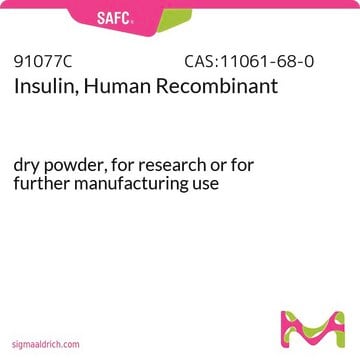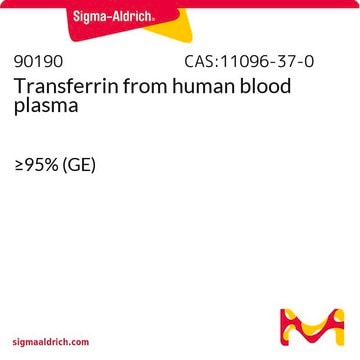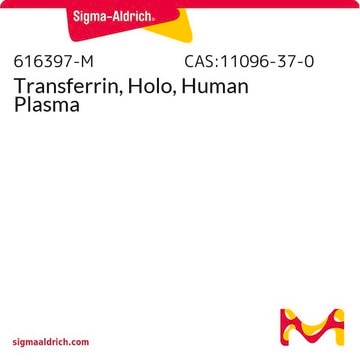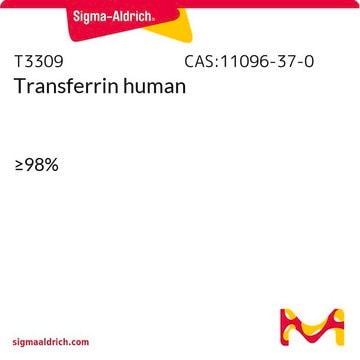SRP6512
Transferrin (HOLO) from human plasma
≥95% (SDS-PAGE)
Synonym(s):
DKFZp781D0156, PRO1557, PRO2086, Siderophilin, TF
Sign Into View Organizational & Contract Pricing
All Photos(1)
About This Item
UNSPSC Code:
12352202
NACRES:
NA.32
Recommended Products
General description
Transferrin is a monomeric glycoprotein found in plasma at an average concentration of 250 mg/100ml. Transferrin (TF) belongs to the family of bilobal glycoproteins which tightly bind ferric iron. Each of the homologous N- and C-lobes of the protein contains a single iron-binding site present in a deep cleft.
Application
Transferrin (HOLO) from human plasma has been used in flow cytometry.
Biochem/physiol Actions
Transferrin (TF) serves as the iron transport protein in the blood. Iron is transported in the serum by binding to circulating transferrin, which in turn binds to receptors on the cell surface. Stored in bone marrow as TF-bound iron, it also possesses bacteriostatic and fungistatic activity. At the alkaline extracellular pH of 7.4, TF binds one or two ferric ions and two iron-bound TF molecules can bind the dimeric transferrin receptor (TfR). At this pH, iron-free transferrin is not recognized by TfR. This is followed by an endocytotic pathway involving the TfR, where the entire complex is internalized by endocytosis. When the pH is reduced in the cell, iron is released from TF leading to a conformational change in each lobe. Two critical lysines in the N-lobe of TF aid this conformational change allowing entry of a chelator to capture the iron. Finally, the complex gets back to the cell surface and the extracellular pH causes the dissociation of the apo-TF molecules from the receptor. Clinically, decreases in transferrin are observed in congenital disorders, newborns, inflammatory diseases, hypo-proteinemias and nephritic syndrome; increases are found in pregnancy, iron-deficiency anemias and inoculation hepatitis. Transferrin is required by all types of cells in cultures for maximal growth. It is, therefore, an important factor used in defined culture media.
Physical form
Lyophilized from 20 mM Na phosphate, pH 7.4 and 150 mM NaCI.
Storage Class Code
11 - Combustible Solids
WGK
WGK 3
Flash Point(F)
Not applicable
Flash Point(C)
Not applicable
Choose from one of the most recent versions:
Certificates of Analysis (COA)
Lot/Batch Number
Don't see the Right Version?
If you require a particular version, you can look up a specific certificate by the Lot or Batch number.
Already Own This Product?
Find documentation for the products that you have recently purchased in the Document Library.
Transferrin receptor 1 is a cellular receptor for New World haemorrhagic fever arenaviruses
Sheli R
Nature (2007)
Yifan Cheng et al.
Cell, 116(4), 565-576 (2004-02-26)
Iron, insoluble as free Fe(3+) and toxic as free Fe(2+), is distributed through the body as Fe(3+) bound to transferrin (Tf) for delivery to cells by endocytosis of its complex with transferrin receptor (TfR). Although much is understood of the
Peter J Halbrooks et al.
Biochemistry, 44(47), 15451-15460 (2005-11-23)
The transferrins (TF) are a family of bilobal glycoproteins that tightly bind ferric iron. Each of the homologous N- and C-lobes contains a single iron-binding site situated in a deep cleft. Human serum transferrin (hTF) serves as the iron transport
Our team of scientists has experience in all areas of research including Life Science, Material Science, Chemical Synthesis, Chromatography, Analytical and many others.
Contact Technical Service








